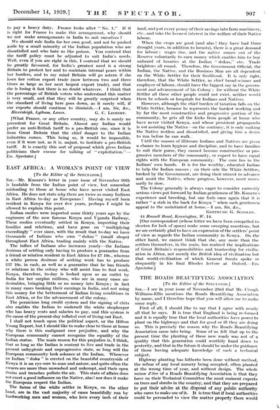EAST AFRICA: A WOMAN'S POINT OF VIEW [To the Editor
of the SPECTATOR.] SIR,—Mr. Kunzru's letter in your issue of November 30th is laudable from the Indian point of view, but somewhat misleading to those at home who have never visited East Africa. He does not state why there are twice as many Indians in East Africa to-day as Europeans ! Having myself been resident in Kenya for over five years, perhaps I might be allowed to explain this point.
Indian coolies were imported some thirty years ago by the engineers of the now famous Kenya and Uganda Railway. These coolies eventually settled in Kenya, importing their families and relations, and have gone on " multiplying exceedingly " ever since, with the result that to-day we have thousands of Indians who own " dukas " (small shops) throughout East Africa, trading mainly with the Native.
The influx of Indians also increases yearly—the Indians desirous of settling only having to produce a guarantee from it friend or relation resident in East Africa for £7 10s., whereas a white person desirous of seeking work has to produce £37 10s. in cash, as well as a guarantee that he has friends or relations in the colony who will assist him to find work. Kenya, therefore, to-day is looked upon as an outlet by India for her surplus millions, who are in many cases un- desirables, bringing little or no money into Kenya ; in fact in many cases banking their earnings in India, and not using this money for the betterment of Indian living conditions in East Africa, or for the advancement of the colony.
The pernicious long credit system and the si.ning of chits also enables the Indian to undersell the white shopkeeper who has heavy rents and salaries to pay, and this system is the cause of the present-day inflated cost of living out East.
I shall not touch upon the political aspect, or the Hilton Young Report, but I should like.to make clear to those at home why there is this malignant race prejudice, and why the European community cannot recognize the equality of the Indian status. The main reason for this prejudice is, I think, that so long as the Indian is content to live and trade in the present unhygienic and unprogressive state, so long will the European community look askance at the Indian. Wherever an Indian " duka " is erected on the beautiful countryside of Kenya it is an eye-sore to man and nature, and quite often the owners are more than unwashed and unkempt, and their open drains and trenches pollute the air. This state of affairs does not exert a good influence on the Native, alas ! nor does it make the European respect the Indian.
The farms of the white settler in Kenya, on the other hand, are in the vast majority of cases beautifully run by hardworking men and women, who love every inch of their
land, and put every penny of their savings into farm machinery, etc., and take the keenest interest in the welfare of their Native labour.
When the crops are good (and alas ! they have had three drought years, in addition to locusts), there is a great demand for labour ; wages rise, and the native comes out of the Reserve voluntarily to earn money which enables him to buy unheard of luxuries at the Indian " dukas," etc. Trade brightens all round. Therefore, the Government Official, the Indian, the Native, and the Business Man are all dependent on the White Settler for their livelihood. It is only right, therefore, that the White Settler, as chief bread-winner and employer of labour, should have the biggest say in the govern. ment and advancement of his Colony ; for without the White Settler all these other people could not exist, neither would there be schools or hospitals for Indians and Natives.
However, although the chief burden of taxation falls on the White Settler, because he represents the hardest working and by far the most constructive and progressive portion of the community, he gets all the kicks from people at home who have never visited Kenya, and whose persistent propaganda is not assisting the Native—on the contrary, it is only making the Native restless and dissatisfied, and giving him a desire to run before he can walk.
Until the masses of illiterate Indians and Natives are given a chance to learn hygiene and discipline, and to have families to suit their purse, they cannot become constructive or pro- gressive members of the community, or expect to have equal rights with the European community. The cure lies in the Indians' own hands. It is for the wealthy, educated Indian to help the Indian masses ; on their side the White Settlers, backed by the Government, are doing their utmost to advance and assist the Native, whose progress, however, must neces- sarily be slow.
The Colony generally is always eager to consider earnestly serious views put forward by Indian gentlemen of Mr. Kunzru's experience and breeding, but one feels once again that it is rather " a stab in the back for Kenya " when such gentlemen appeal to the uninitiated at home.-1 am, Sir, &c., GERTRUDE G. SCJIOLPP.
44 Russell Road, Kensington, 117. 14.
[Our correspondent (whose letter we have been compelled to shorten for lack of space) make some sweeping assertions, but we are certainly glad to have an expression of the settlers' point 'of view as regards the Indian community in Kenya. On the other hand, we cannot think that she, any more than the settlers themselves, in the main, has realized the implications of Great Britain's responsibilities and trusteeship for civiliz- ation in Africa, not merely the British idea of civilization but that world-civilization of which General Smuts spoke SO eloquently in his final Rhodes lecture at Oxford.—En. Spectator.]












































 Previous page
Previous page